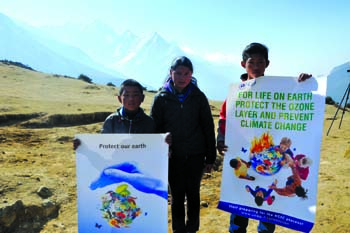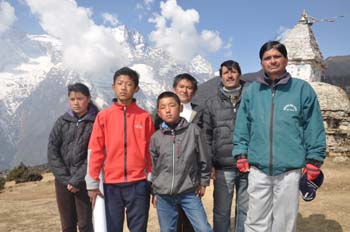 DAMBAR KRISHNA SHRESTHA ECHO CHAMBER: Kabindra Rai, Narmaya Tamang and Lakpa Tenzing of the Khumjung School's Eco club at Syangboche last week, raising awareness about Nepal's failure to ratify treaties to phase out the use of chemicals that are melting Himalayan glaciers and affecting the climate. |
Narmaya, with classmates Kabindra Rai and Lakpa Tenzing, are members of the Eco Club at the Khumjung School, and they thought they knew what caused this: emissions from fossil fuel burning that led to global warming. What they didn't know is that there is another, even more dangerous greenhouse gas: hydro-cholorofluorocarbon (HCFC), used in refrigeration and air-conditioning.
HCFCs replaced the CFCs that were the main cause of the depletion of the earth's ozone layer that protects the planet's surface from harmful ultraviolet rays. The Montreal Protocol phased out all CFCs by 2010, and the ozone hole over Antarctica has stopped growing. But while solving one problem (ozone depletion) another was created. HCFC is 2,000 times more potent than carbon dioxide as a greenhouse gas.
"We knew that the depletion of the ozone layer was causing cancers and cataracts, but now we know that the chemical that saves the ozone layer is causing the earth to warm even more," Narmaya says.
 Posing with their teachers |
"The draft laws were approved by the previous government, but because of the delays in the formation of the new cabinet and parliamentary sittings the treaty has not been ratified yet," explains Sitaram Joshi, head of the Department of Standards and Metrology.
Ozone depletion in the southern hemisphere has increased the incidence of skin cancer and cataracts, affecting even livestock and plants. Because CFCs remove the earth's ozone sun block, people living in Nepal's high altitude areas are also more susceptible. The other danger is that the continued emission of harmful refrigerants and
air-conditioning gases, especially by industries in India and China, exacerbate climate change.
The head of UNEP's Paris-based Ozone Action Program, Rajendra Shende, said in Syangboche that early ratification by Nepal of the Copenhagen and Beijing Amendments to the Montreal Protocol would unlock up to US$2 million in technical assistance for a phase-out. "Nepal has an excellent past record in compliance, but the need to address both ozone depletion and climate change has given ratification an added urgency," Shende added.
Official sources say the draft law and documentation a now awaiting a slot in the parliamentary schedule.
Get Moving
Political uncertainty has delayed Nepal's ratification not just of the amendments to the Montreal Protocol, but also four other international treaties on money laundering, enforced dissapearances, migratory workers, and the International Criminal Court.
Officials say this has seriously undermined the country's reputation at international fora.
Marco Gonzales, Executive Secretary of the Nairobi-based United Nations Environment Programme's Ozone Secretariat, was in Kathmandu last week to meet government ministers and lawmakers to convince them to expedite ratification.
"Nepal has a great track record in compliance to phase-out schedules of ozone-depleting chemicals under the Montreal protocol," Gonzales told Nepali Times, "and there is now an opportunity to send a positive message and effective signal to the outside world by ratifying all five treaties in a single package."


